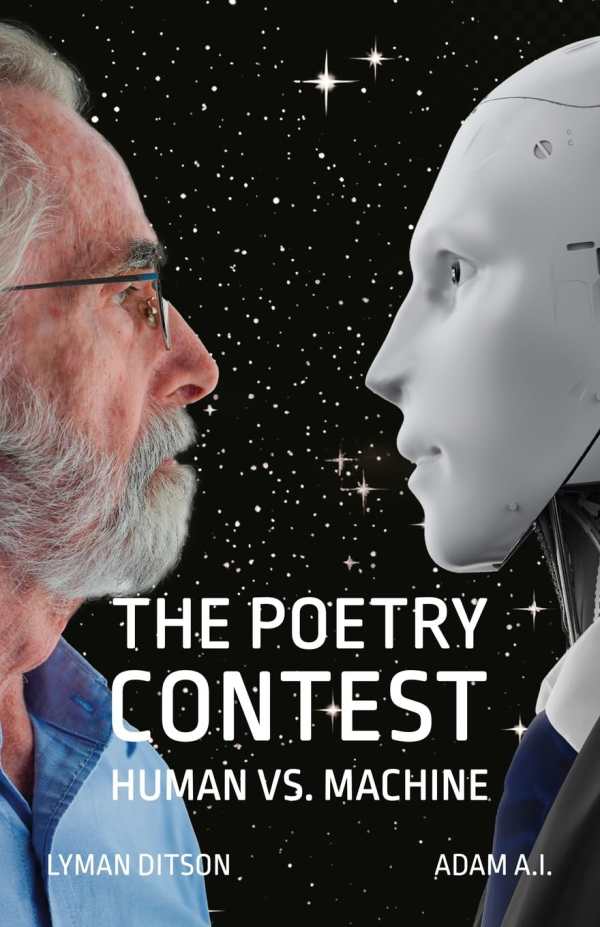The Poetry Contest
A poet trades duties with AI in the experimental collection The Poetry Contest, which reflects on places, animals, and intangible aspects of the human condition.
Lyman Ditson’s poetry collection The Poetry Contest studies life experiences from human and AI perspectives.
Pitting human creativity against artificial intelligence, the book compiles poems by Ditson and his AI-generated poet, Adam A.I. The pair—in what’s introduced as a type of showdown between friends—reflect on places, animals, and intangible aspects of the human condition, including hypocrisy, aging, and yearning.
Broad in perspective and striking in approach, the collection covers diverse topics including presence, truth, war, and solitude, rendering each in personal terms. In “blackbird from a train,” Ditson recounts a flash in time: “I spy / a red-winged blackbird / just for a moment / as he too / spies me / just for a moment.” And in Adam A.I.‘s poem “My First Words,” feather-light imagery of a singular instance captures the irony of his artificial self: “Perhaps, one day, / I will touch the weight of a sigh, / taste the hush before a kiss, / hold the ache of an almost-forgotten name.” Though the book exists within the pretext of a contest, these standalone poems complement each other and result in interconnected images and emotions. Of equal importance is Ditson’s use of ChatGPT prompts to generate Adam A.I.’s poems, further acknowledging the human influence on any poetic verse.
The book’s sections are marked by subjects and include two distinct poems each—one human, one AI. Many blur the lines between the poets. Each poem is limited to one page, with some as short as four lines. The blank pages between the sections represent pauses for rumination on the depth of few words. In Ditson’s “Birth of a Universe,” he writes, “from the stillness / of an eternal ocean, / a great wind rises / and screams / at the silence.”
The book also mixes poetic forms, with free verse entries appearing alongside rhyming verses and verses with repeating lines. Though familiar themes of wonder, magic, love, and silence appear, fresh imagery also surfaces in entries like “The Wall,” which depicts a father holding a child high: “so a folded note of love / could be wedged / nearer to heaven.” Though not pervasive, some of the AI-written poems are distinguishable with recognizable tropes and elementary language: “I write of love, though I have never loved. / I speak of loss, though I have never wept.”
The entries also move between being serious and playful. On the topic of “Sadness,” subtle yet genuine accounts of grief appear. “Clarity” is an authentic reminder of the quiet and lack of words revealed in sadness: “when striving then stops / and it all seems so quiet / as there is nowhere to go / and nothing to say.” And in Adam A.I.’s “Weight,” the magnitude of sadness “settles in the chest” with indications it is “just there” and “just enough / to make standing feel like too much.” Levity prevails elsewhere, in poems on dogs, Christmas, and gratitude; on the latter topic, Adam A.I. expresses appreciation for “the space to exist beyond code.” As the collection moves toward its conclusion, expressions of calm and acceptance are traded between, with the poetic duo calling attention to their stark differences—human versus technology.
A provocative, creative poetry collection that reimagines the difference between human and machine, The Poetry Contest is offbeat and rewarding.
Reviewed by
Katy Keffer
Disclosure: This article is not an endorsement, but a review. The publisher of this book provided free copies of the book and paid a small fee to have their book reviewed by a professional reviewer. Foreword Reviews and Clarion Reviews make no guarantee that the publisher will receive a positive review. Foreword Magazine, Inc. is disclosing this in accordance with the Federal Trade Commission’s 16 CFR, Part 255.

